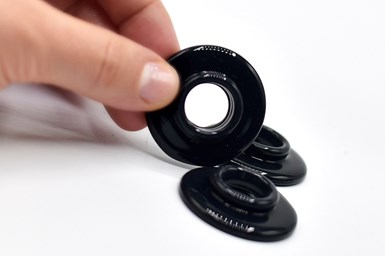Chromatic 3D Materials Launches Rapid Custom Manufacturing Service for Common Rubber Parts
The service includes standard industrial shapes, including gaskets, seals, cylinders and grommets in customizable, nonstandard dimensions up to 16" in diameter.
The company says the technology yields parts with the same durability as molded parts. Photo Credit: Chromatic 3D Materials
Chromatic 3D Materials has launched a custom manufacturing service for durable polyurethane parts with fast delivery and simplified pricing. The company is offering standard industrial shapes, including gaskets, seals, cylinders and grommets in customizable, nonstandard dimensions up to 16" in diameter.
The service is intended to help manufacturers increase supply chain resilience, boost efficiency and reduce waste.
Chromatic’s parts are made with a 3D-printing technology called reactive extrusion additive manufacturing (AM). The company says the technology yields parts with the same durability as molded parts, but offers shorter production timelines and more competitive pricing.
Typical delivery is two to three weeks, with an option to have select parts delivered in as few as five business days for an additional fee. Because there is no tooling required with 3D printing, and thus no tooling costs, it is said pricing is highly competitive with conventional molded parts.
Manufacturers that order custom parts from Chromatic may also find they can make new claims regarding waste and circularity. Chromatic’s 3D printing process decreases material waste up to 90% versus technologies such as injection molding. Moreover, printing rubber parts reduces the need for overtstocking, thus helping companies limit the number of obsolete parts they landfill.
“Manufacturers shouldn’t have to rely on overstocking in order to run a reliable business, but increasing supply chain failures put them in a tough position,” says Dr. Cora Leibig, Chromatic founder and CEO. “We have OEMs coming to Chromatic on a regular basis because they can’t get a hold of common parts. That’s why we are launching our rapid custom manufacturing business. Now companies can quickly and cost-effectively source one part or one million — and keep their customers happy.”
Chromatic’s parts are made with ChromaFlow 70 and ChromaFlow 90, thermoset polyurethanes with Shore A hardness of 70 and 90, respectively. Both material grades are said to offer the same three-dimensional strength and compression set as injection-molded parts.
Chromatic’s service has already been adopted by leading automotive and industrial suppliers in Europe and the U.S.
- Read about how NIAR testing shows that multiple polyurethanes 3D printed by Chromatic are compliant with U.S. standards for use in aircraft interiors.
- Learn how Chromatic’s RX-Flow 3D printers for reactive extrusion additive said to provide a low-cost option for manufacturers interested in testing and implementing industrial 3D printing with more durable, flexible materials than are available with FDM, SLA and other 3D printing technologies.
- Take a look at this article describing how Chromatic’s Smooth-Mode Technology for 3D printing durable rubber parts is well suited for manufacturing rubber bladders and other elastomeric products that expand and contract.
Related Content
-
Understanding PEKK and PEEK for 3D Printing: The Cool Parts Show Bonus
Both materials offer properties desirable for medical implants, among other applications. In this bonus episode, hear more from Oxford Performance Materials and Curiteva about how these companies are applying PEKK and PEEK, respectively.
-
This Drone Bird with 3D Printed Parts Mimics a Peregrine Falcon: The Cool Parts Show #66
The Drone Bird Company has developed aircraft that mimic birds of prey to scare off problem birds. The drones feature 3D printed fuselages made by Parts on Demand from ALM materials.
-
Q&A With Align EVP: Why the Invisalign Manufacturer Acquired Cubicure, and the Future of Personalized Orthodontics
Align Technology produces nearly 1 million unique aligner parts per day. Its acquisition of technology supplier Cubicure in January supports demand for 3D printed tooling and direct printed orthodontic devices at mass scale.
















